There are many amazing books appropriate for 4th-8th graders within the 700-950 Lexile range, to include Newbery winners and best sellers. Lexile only measures text complexity (sentence structure, words per sentence, etc.), not content. Consider that Grapes of Wrath and Charlotte's Web both have a Lexile of 680, which is a "3rd-5th grade" score. With this information, you can ask teachers to reconsider the 1000 point cut-off. I've had some success with that.
But sometimes it doesn't matter. Sometimes, you just have to find a book for class that is over 1000 Lexile. (And sometimes teachers don't have any choice, either.) I recently found a couple of wonderful resources that will hopefully make your life easier. Here is an excellent collection of books from the Brownsburg Public Library that includes classics, YA, and adult fiction and fantasy. I started reading adult fantasy in 8th grade, and it can be quite age-appropriate. For a 7th or 8th grader, I'd definitely consider Hitchhiker's Guide to the Galaxy by Douglas Adams and maybe try out some of the older fantasy books by classic fantasy authors like Mercedes Lackey (Owl Flight), Anne McCaffery (Renegades of Pern), and Terry Brooks (Sword of Shannara.) The pacing may be slower, but if you like any of these, those authors have tons of other books for you to enjoy, set in the same world. And the Elkhorn Library has this incredible list for 5th and up of books that are 1000 Lexile and up. It gives a tiny blurb about each one, too, as well as Reading Counts points. Some of these would be fine for fourth graders, as well. If you haven't read Hatchet by Gary Paulsen, this is your chance to enjoy a fantastic book that is over 1000 Lexile, along with his biography GUTS! Bad Beginnings by Lemony Snicket is good for those elementary kids being told to read 1000 Lexile, to include fourth graders. You can also ask for help from your local school or public librarian to find suitable books. Librarians excel at helping readers find the perfect book--and created both of the linked lists from this post. WE LOVE YOU, LIBRARIANS! Another excellent option for 3rd and 4th graders is The Higher Power of Lucky, by Susan Patron, which won the Newbery Award. It's not on these lists, presumably because it's not technically over 1000 on the Lexile site (it's listed at 950L), but it is also sometimes rated as 1010L, as evidenced by its Junior Library Guild page. Either way, it's a fabulous book if you can persuade your teacher to allow that apparent 50 point difference (mention that it was a Newbery Award winner.) These two lists were more effective for me than searching on Lexile's site, but you can do that, too. Lexile's site is more useful if you have a title that you need to check for its level, rather than searching for a title, in my opinion. Happy hunting for your next required reading, and best wishes! Amy
0 Comments
Hey 4th-8th graders! Today’s post is for you!
Once upper elementary school hits, life gets so busy that juggling your schedule becomes much harder. According to researchers, more and more of you are choosing not to make time for reading. For your teachers and parents, this can be frustrating. Maybe it’s frustrating for you, too.
My observation as a teacher, librarian, and parent is that sometimes selecting a book off the shelf is actually the hardest part of reading. (I will add here that student self-selection of books is fantastic and if your teacher allows it, say thank you. You have higher odds of increased achievement.) Luckily, I’ve got a few books to recommend that I’m willing to bet you’ll enjoy. My recommendations have nothing to do with Lexile scores (an often misused tool) and everything to do with fabulous stories that lots of kids have loved. These are tried and true favorites. If you need a book for class—or just for fun—I dare you to try one of these. Give it to chapter 3 and then let me know what you think. 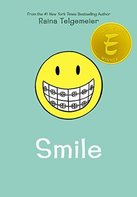
1. Anything by Raina Telgemeier.
They are all super popular: Smile, Sisters, Drama, Guts, and Ghosts. Graphic novels of any kind are a good bet. If your teacher balks at allowing graphic novels in class, invite them to read my article about the benefits of graphic novels. 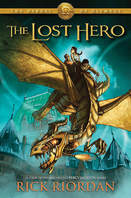
2. Anything by Rick Riordan.
The Lightning Thief is the first book of his first middle grade series, but if you are in middle school, you might prefer starting with Book 1 of The Heroes of Olympus series. The characters are older, and the storyline is more complex. If you’ve already devoured all of his books, consider another upper middle grade fantasy. 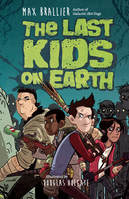
3. The Last Kids on Earth, by Max Brallier.
Humorous tales are always a win, and Last Kids on Earth has the bonus of some inside artwork. Plus ZOMBIES. See also: Wimpy Kid, Big Nate, and I, Funny. 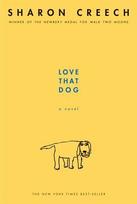
4. Love That Dog and Hate that Cat, by Sharon Creech.
Short, easy-to-read, and totally gripping, Sharon Creech tells this story in a one-sided conversation made of poems. Even my students who claimed to hate poetry loved this book and its sequel. Other novels-in-verse books to consider as well include The Crossover by Kwame Alexander (especially for basketball fans) and Mountain Dog by Margarita Engle. 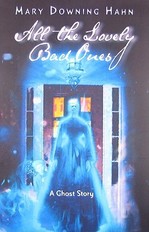
5. Scary books are constant favorites.
You don’t have to stop reading scary stories once you outgrow Goosebumps. Try a novel by Mary Downing Hahn—she’s the queen of ghost stories for young teens. If you’re ready to kick it up another notch, try Coraline, Doll Bones, or The Night Gardener.
If you don’t love a book within the first three chapters, it's okay to abandon it and try a different book. If you find yourself abandoning books all the time, though, consider asking your librarian or teacher for some advice on books you might enjoy. But I would be surprised if none of these worked for you!
Bonus— If you have younger siblings, try reading aloud to your younger brothers and sisters. No, I’m not kidding. Books are magical, and little kids will remind you of this truth if you've forgotten. Watch their eyes sparkle as you read to them. Here are some great books for babies, toddlers, and preschoolers, as well as reading tips and information for families about building a love of reading. The adults in your household will probably appreciate both the linked info and your sibling sweetness.
There is a book waiting for you right now! A perfect book for you! A good book you'll love--you just have to give it a chance!
Happy reading!
|
|
School’s back in session, and with it, comes the nightly homework. Test scores. The dreaded report card. As if it wasn’t enough that you spent all day in class, now you have to show you’ve been paying attention! For those of you new to middle school or high school, you may be finding that the standards jumped a lot higher this year than what you’ve been used to. Maybe your grades aren't where you'd like them to be.
Don’t worry, though. Aunt Amy’s got your back. Follow these five tips, and report card blues will be a thing of the past. |
1. Get organized.
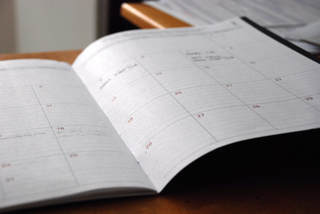 Pixabay, CC0
Pixabay, CC0
The solution? Use your daily planner and keep papers in color-coded folders. If you always put your history homework in the green folder (or blue, or red, or whatever says HISTORY to you), then when it’s time to turn it in, you’ll always know where it is. And if you don’t have homework? Write THAT down in your daily planner. A blank space could mean you forgot to write down the assignment, so always put something for every class, even if it’s “no homework tonight!” Feel free to draw some unicorns on the agenda. Unicorns are never bad.
2. Take notes.
 Pixabay, CC0
Pixabay, CC0
Wondering what to write down? There are some great note-taking videos out there. Crash Course has a whole Study Skills Course that's awesome (and free!) But for starters, if the teacher repeats something, write it down. If they tell you something is important, write it down. If they put something on the board, write it down. Writing something down as you listen forces your brain to analyze the material and put down the most important bits. It’s why typing into your laptop is not necessarily better… the more thinking you do up front, the longer you’ll remember it later. Speaking of remembering class material…
3. Study a little every day.
 Pixabay, CC0
Pixabay, CC0
Know what doesn’t work for the long term? Cramming. Trust Auntie Amy on this one. Yes, you might be able to survive a test by studying furiously the night before, but you are making things much harder for yourself when you have to take end-of-term tests or when the material is something that you will be building on in the next chapter, which is often the case for math, science, and languages.
4. Ask questions.
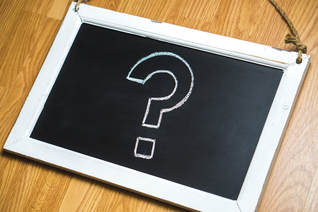 Pixabay, CC0
Pixabay, CC0
And if you have the question, at least a handful of other students do, too. Be brave. Ask the questions.
5. Find a study buddy.
 Pixabay, CC0
Pixabay, CC0
Having to explain something to someone else is a tried and true method of learning material. Remember that just because material feels familiar, it doesn’t mean that you know it. Until you can explain it in your own words to someone else, without looking at your notes, you have more studying to do.
Thanks for joining me for Auntie Amy's Top 5 Tips for Succeeding in School. Simple doesn't mean easy, but it will work if you put your mind to it. Remember, you also need to eat well, get plenty of sleep, and enjoy time with friends and family, too. School is just one part of your wonderful life. Now, go get yourself some folders, an agenda, some notebook paper, and rock out those classes.
One bonus tip for the road:
 Credit: Gratisography, CC0
Credit: Gratisography, CC0
But don't worry. I've got your back.
Here are five steps to follow to finish out your school year with style and grace, instead of blood, sweat, and tears.
1. Don’t cram
Research says cramming isn’t effective, even though a lot of people keep trying. It’s far better to study for 10-15 minutes each day for a week than a bunch all at once. Think of it like taking sips of a slushie instead of gulping it—and getting a brain freeze. Cramming may let you feel like you’ll succeed because the material will look familiar and it’s easy to think, “Yeah, yeah, I know this, I know that,” but recognition is not the same as recalling it. Instead, dedicate a little bit of time every day to study for each final exam. Depending on how much material your test covers, a chapter per day for a week might work.
 Credit: Pixabay, by Komsomolec, CC0
Credit: Pixabay, by Komsomolec, CC0
The science is in: writing things by hand helps us remember things much better than typing them out. You may not be able to write down every word the teacher says—but that’s precisely what will help you discern what is actually important to know and summarize as you listen, so you can write down only the critical stuff. Or even if you take notes in class on a laptop, go home and make notecards the old-fashioned way to help lock in the information you’ll need.
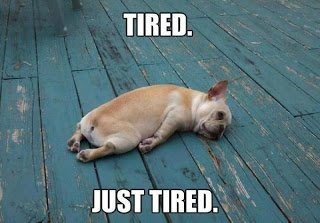 Credit: Meme.com
Credit: Meme.com
Sleep is critical to our health, but also to our learning. Sleep consolidates our new knowledge and organizes memories. Getting a good night of shut-eye is your best tool for making sure you remember what you studied the night before. Logically, this means that pulling “an all-nighter” is a really bad idea. Not only are you cramming (see point 1) but you aren’t giving your brain any time to absorb the material.
 Credit: Pixabay, by Aedrozda CC0
Credit: Pixabay, by Aedrozda CC0
We all know that eating well is a priority, but sometimes, it just doesn’t happen. Breakfast in particular can be tough to maneuver on a busy school morning. But on test days, it’s critical that you eat a solid breakfast with protein so your brain has the energy to carry you through the day. As a bonus, eggs contain a nutrient that is thought to help improve memory and cognitive performance. And don’t forget to stay hydrated! Fast and easy ideas: Yogurt parfait, breakfast burrito, fruit smoothie with protein powder, oatmeal made with soy or dairy milk for a protein boost.
 Credit: Gratisography, CC0
Credit: Gratisography, CC0
5. Decide your goal and go for it.
Writing down your goals or stating them in public helps people reach their goals. Goals help us stay more accountable. So write down your test goal and post it in your room. Tell your friends, parents or teacher that your goal is to make whatever grade you need—an A, a B…even if it's just to pass! You are much more likely to do so once you’ve officially committed to doing it. Goals transform people from wishers to doers.
With a little planning and dedication, you can ace all your finals and soar off into summer with victory. Decide to rock your finals and end your school year strong.
You’ve got this.
Amy Bearce
To young readers, I hope I can offer a smidgen of help & encouragement as you traverse the waters of school, friendships, and life.
For those who are writers or aspiring writers, I will occasionally share thoughts on the writing process. Hope it helps!
For librarians and teachers, I sometimes share resources on books, reading, and writing.
For those who are readers of any ages, I like to share when a book totally floors me. Share the love if you agree.
Archives
June 2023
October 2022
August 2022
July 2022
June 2022
May 2022
February 2022
October 2021
August 2021
July 2021
May 2021
April 2021
March 2021
February 2021
January 2021
August 2020
July 2020
June 2020
April 2020
February 2020
January 2020
November 2019
October 2019
August 2019
July 2019
June 2019
May 2019
April 2019
March 2019
February 2019
January 2019
December 2018
October 2018
September 2018
August 2018
July 2016
May 2016
February 2016
June 2015
March 2015
January 2015
December 2014
Categories
All
Book Recommendation
Events
News
School Success
Summer
Words About Writing



 RSS Feed
RSS Feed